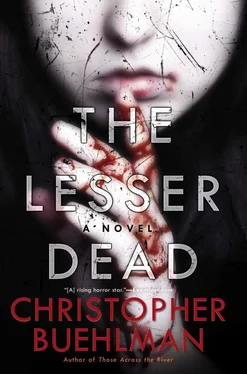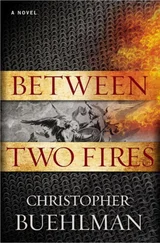“I grew up in Brooklyn,” she said. “I knew one of you when I was a teenager. He would visit me. He was… kind. At a time when no one else was.”
“He have a big ugly head?” I said, so quietly she must have barely heard me.
Off with her head!
She nodded, barely, not wanting to call him ugly. John Valentine. The one who turned Margaret, the one who burned up when his building fell down. The one who could ride a horse. The fact that he turned Margaret made him my grandfather, in a way. Now here was someone who knew family. This was Margaret’s wake, in a way, the only one she would get.
“I lost someone tonight,” I said.
“I’m sorry. Who?”
Never call me your mother again.
“My mother.”
She took my hand in hers and the warmth coming from her almost burned me.
“Your real mother?”
“Real as I got.”
She nodded.
“You have to eat. Don’t you?”
I looked at my feet. My ugly, veiny, pale feet. My sprint through Manhattan had abused them. New York is not made for bare feet; I had felt the dig of broken glass and the sting of pop tops, I had scraped their tops on curbs, even paused to unsheathe a hypodermic needle from my heel near Tompkins Park. This had all gone away almost as quickly as it had happened. But the worst thing was that I had tracked dog shit into her loft. Of all the things, just dog shit. She noticed, but didn’t care.
This woman, and I never found out her name, pulled her scarf away from her neck, pulled down her sweater.
“You have to promise,” she said.
“What?”
“You know what. Not too much.”
I didn’t say anything.
“Don’t make me… like you are. I don’t want that.”
I didn’t say anything.
“Go on,” she said.
I sat there, a drugged cat.
“Go on.”
* * *
She got the shakes after I fed, but they went away when she smoked a tight little joint; she really knew her way around rolling paper. Neither one of us talked much. I think she was wrestling with whether to ask me to stay, but I didn’t want to. Her huge windows faced east anyway, and the filmy March sun was going to come looking in every corner of that place. There was a bathroom, but it had a window, too, and no tub. The shower was just a hose and a hole. The toilet ran all the time. She gave me a pair of jeans that sagged in the butt and a shirt, I won’t call it a blouse, with tiny flowers on it like cute, curly weeds, fake pearl snaps for buttons. It was nothing Charles Bronson would wear, but it was better than the shredded, blood-stiff rags I had worn through her window. Clothes were the least of my worries. She went to get me a scarf, too, but I took off out the window while she fished in the closet. I suck at good-byes.
As I walked fast away from there, I stuck my hands in the pockets of my new droopy-ass jeans, felt paper. Three dollars. She must have got them off the dirty pile.
It was three A.M. or so; I didn’t have long to find a hidey-hole. The thought that I could die that way, just crisped by the sun, seemed tiresome to me after all I’d just been through, like somebody should have given me a pass just this once. I needed sleep, but I knew what I would dream about so the thought of closing my eyes made me shudder.
My feet took me home. Not to the subways, not down a manhole, but home . Before I even knew what I was doing, I was standing in front of the place I grew up, looking up at my old window as Margaret once had, throwing coins up at me. The streetlight was still there. I hadn’t been by in a good decade, and not at all before that. When you’re dead, you don’t want to see your folks. Somebody in my family might have still been there ten years ago when I had walked by as if on a dare, with a fedora on and my head down, but not now. They had changed the place into a café. Stubbed-out cigarette butts, all of them smoked to the filter, a few of them lipsticky, lay on the street and sidewalk; I could almost hear some long-haired schmuck playing guitar surrounded by NYU chicks in thrift-store leather coats. All of them eyeless, all of them blind rabbits, while above them a gorgon in the upstairs window was waiting for me to look at her, ready to turn me to stone. Or maybe I was waiting up there, fourteen years old again, no, more innocent, make it six years old, and if I just looked up and met my own gaze I would magically go back into my body. 1925. The stock market humming along on phantom cash, Vilma making paprikash or marzipan. It’s magic for me to walk around without a heartbeat, right? It’s magic for little kids to live hundreds of years and kill stacks of people, right? Why not something good for a change? Why not let me go?
“I’m sorry for what I did to Margaret,” I said, closing my eyes hard. “I’m sorry I was such a rotten kid. I’ll do better. I swear. Just take it all back, okay?” I turned my head up and looked. No little Joey. Just black windows on the face of that house, one with a crack in it. The blindest of blind rabbits. I didn’t know who I was praying to, anyway. I was the property of the god of small places, and that god was deaf to everything said aboveground.
“What am I going to do?” I said.
Go back for Cvetko.
Run away.
Sit on a bench at Battery Park and wait for the sun.
Damned shame coins didn’t have three sides.
* * *
I didn’t feel like I had a whole lot to lose when I knocked at the Hessian’s door. I didn’t even know I was going there until I found myself looking up at the huge oak door with the carved acorns and oak leaves, little squirrels in the corners. Big mean old bastard like that and he had squirrels on his door. The knocker was more his speed, a big brass bear’s head, the coolest knocker I ever saw. I didn’t know what I was going to say until just before I knocked. I just grabbed the ring in the bear’s mouth like I was holding a subway strap and I hung there until I heard the words in my head: Hello, Mr. Messer. I know I haven’t seen you in a long time, it’s Joey Peacock, this isn’t my shirt, but I was wondering if you would be willing to help me. I want to get rid of these vampires that look like children, but they’re not children. They’re evil, but the big kind of evil, not like us. They told dirty lies about you and killed my friends. You’re reasonable, right? Margaret said you were a mercenary, which means you fight for money, no offense, or at least you did. I could pay you. Not a lot right now, but I could owe you. I’m a really good thief and I don’t mind trying something big. It would have to be big, like diamonds or a bank, because this won’t be easy. They’re dangerous. Really, really dangerous. And I don’t know what else to do.
Hopeless, right? But what the fuck.
Really, what the fuck.
I knocked.
The Luftwaffe-looking doorman must have known I was standing there rehearsing what I was going to say; I got the idea that they didn’t miss a lot in that house. Maybe they had cameras, but I didn’t see one. The door swung open quietly; you expect a creak out of a door like that.
“May I help you?” he said, looking at me in no particular way. Hard to tell if he remembered me. Servants always act like they don’t remember you.
“Do you remember me?” I said.
He blinked once, slowly, like a lizard, if they blink.
“Would it please you if I remembered you?”
“Sure. I guess.”
“Then of course I remember you.”
He was still standing half behind the door, making no move to open it wider or invite me in.
Damn, he was handsome. He wasn’t young anymore, but he had one of those faces. Weird watching people get old; you have to be old yourself to get it. I don’t like suddenly seeing regular people again after fifteen, twenty years, it’s depressing. He still looked good, but for how long? He was the night shift guy; you’d think Messer would have turned him.
Читать дальше












